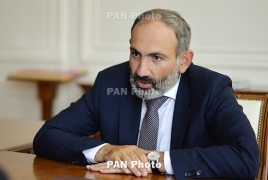Armenia PM evaluates talks with Azerbaijani leader as positive March 30, 2019 - 10:33 AMT PanARMENIAN.Net - Armenian Prime Minister Nikol Pashinyan has said that there has not been a breakthrough in the negotiation process with Azerbaijan, but the importance thing is that the process has started. At the same time, the Premier gave a positive assessment of the overall meeting. He made the comments at a meeting wth the representatives of the Armenian Diaspora in Vienna following his talks with Azerbaijani President Ilham Aliyev. The two met in Austria to hold negotiations on the settlement of the Nagorno Karabakh conflict. "I positively assess our meeting with President Aliyev. I cannot say that there has been a breakthrough in the negotiation process, a revolution or a turning point, but it is important that a process has started, which allows us to speak about our agenda, ideas, concerns and talk about the process I referred to in Stepanakert and later on during my press conference," the PM said. "I hope that President Aliyev will make a positive assessment of the meeting. I would like to weigh in on a nuance. By saying that I positively assess the outcome of our meeting, I do not mean that someone has won or lost at all. As a matter of fact, meetings used to be held in that very logic until now. The point in today’s talks was not to go out and declare about one’s victory. This was just the case during discussions in Dushanbe, Saint Petersburg, and Davos. "A dialogue is underway, and each side has its own ideas. The conflict is deeply rooted, and we need to state that we do not deal with a simple situation. This is a very serious problem, and I find it important to shape an atmosphere where we can voice and talk about each other’s concerns. We should have the understanding that there is nothing harmful in talking to each other. The point is whether we can stabilize the situation at the line of contact, whether we can ensure that people in the border villages may live a normal life without any fear that snipers can kill them in the exercise of farming activities. We must understand whether we can reflect on humanitarian aspects. "There are civilians living on both sides, and we should understand whether we can try to organize meetings between individual families so that people could communicate with one another, or whether we can task our foreign ministers to follow up on the talks in order to understand the point of the problem. But it is also clear that each side has its own position in which they are deeply convinced. Nevertheless, we can also try to speak about the opponent’s position in order to understand the rationale behind the opposite position. "In this sense, I consider this meeting quite positive. Frankly speaking, I still do not know President Aliyev’s opinion of the talks, but I do hope that at least there will be no visible discrepancies in our assessments."  The conflict between Nagorno Karabakh and Azerbaijan The conflict between Nagorno Karabakh and Azerbaijan broke out as result of the ethnic cleansing launched by the Azeri authorities in the final years of the Soviet Union. The Karabakh War was fought from 1991 (when the Nagorno Karabakh Republic was proclaimed) to 1994 (when a ceasefire was sealed by Armenia, NKR and Azerbaijan). Most of Nagorno Karabakh and a security zone consisting of 7 regions are now under control of NKR defense army. Armenia and Azerbaijan are holding peace talks mediated by the OSCE Minsk Group up till now. The foreign ministers of Armenia and Azerbaijan, Ararat Mirzoyan and Jeyhun Bayramov, have arrived in Washington. The CSTO budget for the current year requires adjustments due to the refusal of Yerevan to pay their share of contributions. Six total incidents have burned 19 old-growth trees. Friday night 8 trees were torched along the beautiful main entrance. The EU does not intend to conduct military exercises with Armenia, Lead Spokesperson for EU Foreign Affairs and Security Policy Peter Stano says. Partner news |